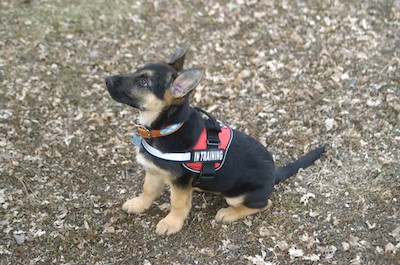My Pet World: What to Do with an Overprotective Dog
Plus a puppy training question

In this edition of ‘My Pet World,’ pet advisor Cathy M. Rosenthal advises an 88-year-old dog owner on overprotective rescue dog remedies for her yappy 2-year-old papillon mix and a grandmom whose son and his family have gotten a new puppy.
Dear Cathy: I rescued a 2-year-old papillon mix four months ago. She is the most loving, cuddly dog and loves people. My problem is her barking. I like it that she barks when the doorbell rings or someone approaches the house. I feel safe since I am 88 years old and live alone. However, she also does not like any dogs walking by the house. I wouldn’t mind if she just barked, but she gets very angry and aggressive. I have taken her to a day camp twice and left her for four hours. She has been in with other dogs her size and was calm. If this is a protection problem, what suggestions do you have to stop the aggression? I’ve tried calming her and giving her a treat. Would appreciate any suggestions you have to offer.
– Dee, Henderson, Nevada
Dear Dee: I am not sure where she is when other dogs are passing by, so I am going to give you instructions on what to do when she is leashed. The first thing I suggest is changing to a head halter (available at pet stores) when you walk her to gain greater control over her behavior. (Look for videos online on how to habituate a dog to a head halter.)
Second, get her a pheromone collar for her to wear for the next 30 to 60 days. These collars can provide some sense of calm for a dog, making her more receptive to training.
Next, take her for a walk where there are no people or dogs around. As you walk, give her praise with a reward word like “awesome” and a treat every time she looks at you. By learning how to “check in” with you, you are taking the pressure off her to be protective. Once she does this repeatedly without your prompting, take her some place where you can watch people and dogs – from a distance where she won’t bark – and reward her every time she “checks in.” Keep this practice up for as long as needed before reintroducing her to a walk with a few people and dogs around.
If you encounter another dog or human, she should naturally “check in” with you. If she reacts, turn and walk the other away or step in front of her, tell her to sit, and then turn so you are in between her and the other person or dog. This posture lets her know you are in charge and don’t need protection.
If she doesn’t improve after a few weeks, please find a trainer that you can work with one-on-one.
 Dear Cathy: My son and family have a new puppy. Can you steer me to an appropriate book on training a dog? I’m overwhelmed by all the dog training books available. I would hope that my son’s two teen daughters might read the book, or parts of it, also.
Dear Cathy: My son and family have a new puppy. Can you steer me to an appropriate book on training a dog? I’m overwhelmed by all the dog training books available. I would hope that my son’s two teen daughters might read the book, or parts of it, also.
– Barbara, North Las Vegas, Nevada
Dear Barbara: It’s great when the entire family is interested in training the new dog in the house. The important thing is to be sure everyone is using the same training techniques as this will help the puppy learn quicker.
It’s been a while since I have thumbed through new dog training books, but my go-to gift for new dog parents is “Clicker Training with Your Dog: Step-by-Step in Pictures,” written by Peggy Tillman. The book offers detailed and visual instructions on how to use a clicker (available at pet stores for under $3) to mark behaviors you want your dog to learn. Once your dog understands what a clicker means, you will be amazed at how quickly they learn.
Make sure everyone in the family understands to say the command, click the clicker when the dog obeys the command and give a treat immediately after the click so the dog makes the connection. Pair the click with a reward word like “awesome” so you can eventually replace the clicker with that word. Give this training technique a try and let me know what you think. It should be easy for everyone in your family to follow.
Cathy M. Rosenthal is a longtime animal advocate, author, columnist, and pet expert who has more than 25 years in the animal welfare field. Send your pet questions, stories, and tips to cathy@petpundit.com. Please include your name, city, and state. You can follow her @cathymrosenthal.
© Tribune Content Agency, LLC.
Products linked from Boomer to Amazon have been vetted and recommended. As an Amazon Associate, Boomer Magazine earns from qualifying purchases of linked products.


